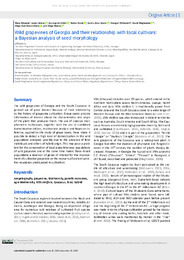Por favor, use este identificador para citar o enlazar este ítem:
https://hdl.handle.net/11000/38300
Wild grapevines of Georgia and their relationship with local cultivars: a Bayesian analysis of seed morphology
Título :
Wild grapevines of Georgia and their relationship with local cultivars: a Bayesian analysis of seed morphology |
Autor :
Kikvadze, Maia
Valera, Javier
Obon, Concepcion 
Ocete, Rafael
Álvar Ocete, Carlos
Kikilashvili, Shengeli
Maghradze, David
Rivera Obón, Diego José
Rivera, Diego |
Departamento:
Departamentos de la UMH::Biología Aplicada |
Fecha de publicación:
2024 |
URI :
https://hdl.handle.net/11000/38300 |
Resumen :
The wild grapevines of Georgia and the South Caucasus in
general are of great interest because of their relationship
to the history of grapevine cultivation. Grape seeds provide
information of interest about the characteristics and origin
of the plant that produces them. The use of classical morphometric
techniques, together with the use of combined
domestication indices, multivariate analysis and Bayesian inference,
applied to the study of grape seeds, have made it
possible to detect a high level of domestication in the wild
populations analyzed, possibly due to the presence of feral
individuals and others of hybrid origin. This may pose a problem
for the conservation of local autochthonous populations
of wild grapevine and at the same time makes these mixed
populations a reservoir of genes of interest for the improvement
of cultivated grapevine or the recovery of ancient varieties
nowadays predisposed in cultivation.
|
Palabras clave/Materias:
Ampelography
grapevine
biodiversity
genetic resources
agrobiodiversity
Vitis vinifera
Caucasus
feral
hybrid |
Tipo de documento :
info:eu-repo/semantics/article |
Derechos de acceso:
info:eu-repo/semantics/openAccess |
DOI :
https://doi.org/10.5073/vitis.2024.63.09 |
Publicado en:
VITIS: Vol. 63, Art. 9, 19 pp. (2024) |
Aparece en las colecciones:
Artículos - Biología Aplicada
|
 La licencia se describe como: Atribución-NonComercial-NoDerivada 4.0 Internacional.
La licencia se describe como: Atribución-NonComercial-NoDerivada 4.0 Internacional.
 La licencia se describe como: Atribución-NonComercial-NoDerivada 4.0 Internacional.
La licencia se describe como: Atribución-NonComercial-NoDerivada 4.0 Internacional.
.png)
